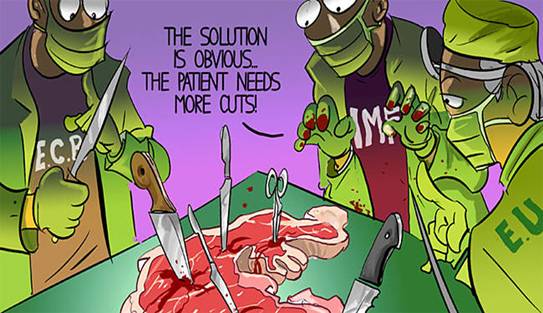Greece's dilemma in fiscal cuts and EU membership
- By Jiang Shixue
 0 Comment(s)
0 Comment(s) Print
Print E-mail China.org.cn, May 16, 2012
E-mail China.org.cn, May 16, 2012

In the cartoon, the troika of the IMF, the EU and the European Central Bank, are depicted as ruthless butchers: knives in hand, slicing meat off of the debt countries. "The solution is obvious," they say. "The patient needs more (fiscal) cuts!"
Negative effects stemming from the fiscal cuts as demanded by the troika for Greece and other debt countries are obvious. Apart from sluggish growth from the belt tightening measures associated with fiscal cuts, there are also widespread social unrest in the forms of protests, unemployment and suicide, among others.
On May 6, the Greeks had a golden opportunity to express their anger against fiscal reduction. Voters weary of austerity measures and deep economic crisis punished the country's mainstream and pro-austerity parties at the polls; center-right New Democracy and center-left Pasok, the two parties that have ruled Greece for four decades, suffered an embarrassing setback in the parliamentary election whereas parties that rejected belt-tightening made big gains. The reason is straight forward: The two losing parties had agreed to accept the troika's austerity measures simply in exchange for two bailout packages totaling 220 billion euro.
Greece faces an obvious dilemma. Without external assistance, countries in debt crises would go bankrupt. But the bailout comes with tough conditions, that the beneficiaries must cut their spending. Undoubtedly, if Greece cannot meet its fiscal cutting target, the troika will not bail it out.
This kind of tradeoff is not new. In the 1980s, when Mexico and other Latin American countries fell into debt crisis, the IMF, along with the US, demanded cutting deficits in budget and trade, to be implemented before they would give aid. These measures led to an immediate nose-dive in economic growth.
The sad story took place again in 1997 when East Asia was caught in a financial crisis. The treatment was identical. Thailand, South Korea, Indonesia and some other Asian dragons were forced to adopt austerity so as to acquire external assistance. The effect was the same. Fiscal cuts let to severe economic recession in these nations.
The troika at present has good reasons to explain its belt tightening policies. Since Greece, Ireland and Portugal have huge fiscal deficits, how can they continue to spend as much money as they wish? As the saying goes: "No pain, no gain." That is why Spain and Italy would not agree to accept troika's help even though their economies are in great difficulties.
José Manuel Barroso, president of the European Commission, was reported to say, "The Greek people have been accepting extremely difficult sacrifices and I think now, if there is a real commitment to implement all the programs, these sacrifices will be remunerated, creating conditions for growth and jobs in Greece."





